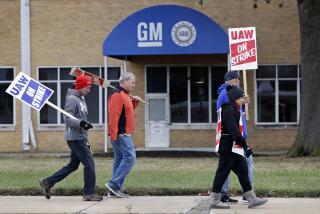GM Will Shift Some Pension Benefits
- Share via
General Motors Corp. said Tuesday that it would freeze or eliminate traditional pension benefits for salaried workers in the U.S. and move newer hires into a plan that relied more on 401(k) investments as the automaker continued to cut costs.
The changes start next year and affect about 42,000 workers, including top executives, accountants, plant managers, designers and engineers. The automaker, which lost $8.6 billion last year, is shifting away from the guaranteed lifetime monthly pension payment plan it helped pioneer in the 1940s.
“These decisions are difficult, but necessary to position GM for future success,” Chief Executive Rick Wagoner said. “These changes will reduce financial risks and future costs for GM [and provide] competitive and fair retirement benefits going forward.”
The pension changes do not affect current retirees or GM’s 105,000 hourly union workers in the U.S.
GM is the first Detroit automaker to make a shift in pension benefits, following a similar announcement in February by the North American unit of Japan’s Nissan Motor Co. Nissan is not unionized, however, and its pension changes applied to both hourly and salaried workers.
GM’s move will probably be copied by Ford Motor Co. and DaimlerChrysler’s Chrysler Group and “is a preview of coming attractions for what GM and the other Detroit automakers are likely to be seeking” from the United Auto Workers next year when new contract negotiations begin, UC Berkeley professor and labor specialist Harley Shaiken said.
David Cole, director of the Center for Automotive Research in Ann Arbor, Mich., expects Ford and Chrysler to match GM’s pension changes “in a matter of weeks, if not days” to remain competitive.
Neither company would comment Tuesday.
GM expects the new plans to save it $420 million on a pretax basis next year, and to reduce its pension liability by $1.6 billion at the end of 2006. GM’s pension liability was $10.92 billion in December.
The automaker is following other large employers in trying to cut pension costs. About 80% of U.S. private businesses, including IBM Corp. and Hewlett-Packard Co., have ended traditional guaranteed pensions in favor of 401(k) retirement plans, Shaiken said.
GM and Ford have been losing sales and market share to foreign brands in the U.S. for decades. And both automakers have complained bitterly that company-paid benefits for their hundreds of thousands of workers and retirees place them at a competitive disadvantage to carmakers in Asia and Europe whose workers are covered by national health and pension plans.
GM said the changes to its salaried pension programs would affect 36,000 automotive employees and 6,000 salaried workers at General Motors Acceptance Corp. -- a finance unit it is trying to sell to raise cash.
The company’s move “is significant because it was GM and the other Detroit automakers who wrote the corporate social contract with workers after World War II ... that said the employer will reward loyalty by taking care of the worker,” Shaiken said. “Now the message is, ‘take care of yourself.’ ”
GM will still provide a monthly pension for salaried workers hired before 2001, but with reduced benefits credited for years worked after 2006.
For those hired since 2001, GM will end the guaranteed pension plan and replace it with a 401(k). GM will contribute 4% of each employee’s annual pay into the tax-deferred program and allow employees to make additional contributions and to manage their investments. GM will match 50% of a salaried worker’s contribution, as much as 4% of their base salary.
The pension changes follow a deal GM reached with auto workers in November to cut health benefits for retired hourly workers. That deal, which would save the automaker $1 billion a year, is awaiting court approval.
GM’s stock rose 48 cents to $20.29.






